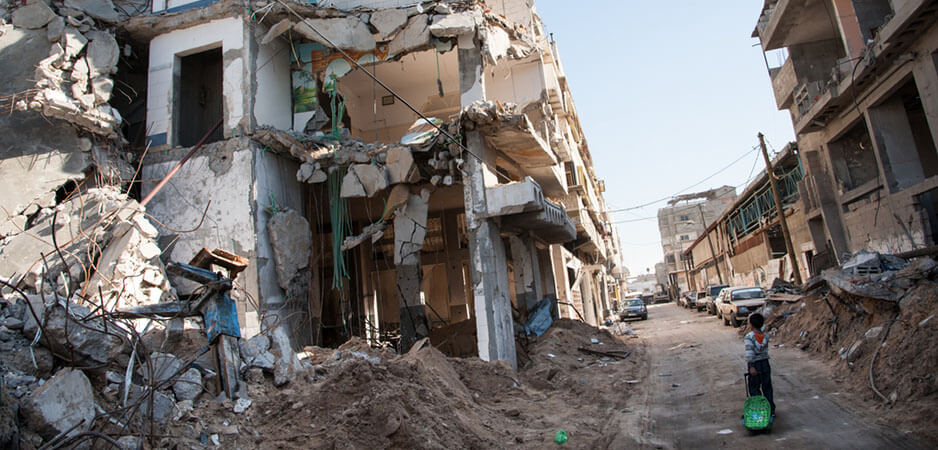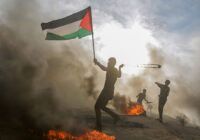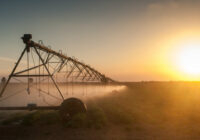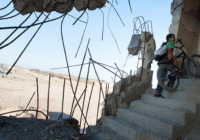This is why Palestinians marched to the border of Gaza and Israel, says Omar Shaban in Gaza City.
On March 30, tens of thousands of Palestinians headed toward the Gaza-Israel border in what became known as the Great Return March. The reason for this was not the decision to move the US Embassy to Jerusalem; it was the tragic situation that Palestinians in the Gaza Strip have lived in for over a decade. The ongoing 11-year Israeli siege of Gaza, division among Palestinians and three major wars have resulted in a miserable economic situation and the inability to travel, as well as absolute devastation with countless destroyed homes.
Added to that, both electricity and water are scarce in Gaza, one of the most densely populated areas in the world. There are nearly 2 million people who live in a strip of land just 25 miles long. In 2010, Gaza was described as “open-air prison” by then-British Prime Minister David Cameron.
Coupled with this is the failure of the peace process that the Palestinian Authority has been leading for years, and the armed resistance that Hamas and other Palestinian movements have been pushing too.
Just for a second, imagine living in Gaza.
That’s where the idea of protesting came from. While Palestinians have marched in the past, there has never been an optimum time for peaceful protests in the pursuit of basic human rights and an end to the Israeli occupation. This is due to restrictions that are placed on public protest, especially in the West Bank.
Tens of thousands of Palestinians joined the Great Return March on every Friday since Land Day — which occurs on March 30 in commemoration of the 1976 protest against the theft of Palestinian land — and it has since become a form of mobilization for Palestinians in seeking their rights.
On May 14, which was set to be the peak of the march, Palestinians marked the 70th anniversary of al-Nakba — the day Palestinians mark the anniversary of the establishment of Israel in 1948 and their nakba (catastrophe), when people were driven out of their homeland in Mandate Palestine. On Monday alone, Gazans were met with heavy bloodshed as more than 60 people were killed and over 2,700 were injured. Since the beginning of the Great Return March, more than 118 people have been killed and over 12,000 injured.
Right of Return
Palestinian refugees have dreamt of their right of return for over 70 years. This is a right enshrined in the UN General Assembly Resolution 194, which was passed in 1948. Generations of refugees have passed — from grandparents to grandchildren — and they have carried this dream with them. Today, the population of Palestinian refugees and their descendants has reached more than 6 million people scattered all over the world. But with the Syrian crisis, financial cuts to the UN Relief and Works Agency (UNRWA), and the decision to move the US Embassy to Jerusalem, the issue of Palestinian refugees has taken a backseat.
The situation with Palestinian refugees is different from others, however. On May 14, 1948, Israel announced its independence and has since then celebrated that day each year. For Palestinians, this is the Nakba when they became refugees in their own homeland. At that time, Palestinians were forced and/or fled from their homes in fear and sought refuge in different cities and different countries. They traveled without money, food and even basic clothing.
Palestinian refugees were not simply the result of civil war or an internal conflict. They didn’t back then and still to this day do not want to live in the countries they were pushed into — Lebanon, Jordan, to name just a few — and they didn’t seek to cross borders. They certainly didn’t want to change their identity and passports. Palestinians are not only refugees outside of Palestine, but also refugees inside their own homeland having been forced to flee internally in 1948 and 1967.
After 70 years, what has changed? To this day, Palestinians must still rely on the support of UNRWA, the Palestinian refugee agency. Palestinians simply want to return to their homeland, and this is their right to return.
Knowledge About Refugees
The word refugee has become trendy amid the technological advancements of news networks and social media platforms. It has become fashion to use hashtags in support of refugees. While there are those who are genuinely sensitive to word “refugee” and raise awareness about their plight, others simply do not care.
In 2011, the United Nations High Commissioner for Refugees (UNHCR) conducted a study on Americans and their knowledge of refugees. The results showed that half of Americans knew nearly nothing about refugees around the world.
This has led to a huge gap in knowledge when it comes to humanitarian work and what refugees go through every day. There are far too many people who know nothing about the life of a refugee whether they are Palestinian, Syrian or Rohingya.
The Young Palestinian
I am considered to be a Palestinian refugee. I am 55 years old and was born in Gaza. Although I did not live through the Nakba of 1948, I still live with its consequences today. The same goes for the youth.
In 2018, the young Palestinian refugee wakes up, washes their face with a handful of water, saving the other handfuls to use during the day due water scarcity inside their refugee camp. Their house — many still containing asbestos — consists of two rooms and a bathroom covered with a zinc roof.
The number of family members is usually more than 10 people, including the parents. Living in a crowded house, the refugee learns to spend most of their time sitting in the one-meter-wide alley, chatting about their daily lives and dreaming of one day ending their misery. This is the situation of Palestinian refugees in the camps in which they dwell, whether this is in Gaza, Jordan or Lebanon.
Palestinian students, with more than 1,000 pupils at each school, sit in crowded classrooms of around 35 to 50 kids in rooms designed to hold 20 to 30 people. Another disadvantage the student has to face is poverty. While their parents are not qualified to work in today’s industries, and some of them are too old to do manual labor, young Palestinians find themselves with not enough food, money for school textbooks and no hope for a better future.
The young refugee feels that they do not belong to anywhere except sports, where they are not considered a threat to others or questioned about their lives. Instead, he or she plays for the sake of enjoying what can be enjoyed and escaping from hardship. Yet young Palestinians need to be educated and given hope and a chance to succeed. They are entitled to basic human rights and should be given the opportunity to create a better future for their family. This is despite the fact that he or she might not be able to pay for university or find a decent job in the end.
This is the Palestinian refugee who was once a dreamer, but now only dreams of returning home.
Memories of Palestine
The experience of Palestinian refugees is special when it comes to the time of his or her displacement. Those who lived the Nakba in 1948 still recall something small that was in their homes or the surrounding environment from which they were displaced in Mandate Palestine.
On every anniversary of the Nakba, they sit together as families and let the elders educate the youth about when life was peaceful. Grandparents talk about their homes and daily routines, the first radio that entered their town, and what weddings were like back then. Descendants of refugees are left wondering if they will ever return one day and, if they do, would it still feel as beautiful as their grandparents once said? They pray for their return to peace and security in the land their families grew up in.
Following successive decades of dreaming about their right of return, refugees have a special symbol of Palestine: The “key of the house” is handed down from generation to generation. This has become part of Palestinian heritage and the identity of a refugee. Heritage is something that refugees hold onto.
Today, however, Palestinian refugees are watching their people being displaced once again, this time in places like Syria. History is repeating itself and there is no end in sight.
The views expressed in this article are the author’s own and do not necessarily reflect Fair Observer’s editorial policy.
Photo Credit: Ryan Rodrick Beiler / Shutterstock.com
Support Fair Observer
We rely on your support for our independence, diversity and quality.
For more than 10 years, Fair Observer has been free, fair and independent. No billionaire owns us, no advertisers control us. We are a reader-supported nonprofit. Unlike many other publications, we keep our content free for readers regardless of where they live or whether they can afford to pay. We have no paywalls and no ads.
In the post-truth era of fake news, echo chambers and filter bubbles, we publish a plurality of perspectives from around the world. Anyone can publish with us, but everyone goes through a rigorous editorial process. So, you get fact-checked, well-reasoned content instead of noise.
We publish 2,500+ voices from 90+ countries. We also conduct education and training programs
on subjects ranging from digital media and journalism to writing and critical thinking. This
doesn’t come cheap. Servers, editors, trainers and web developers cost
money.
Please consider supporting us on a regular basis as a recurring donor or a
sustaining member.
Will you support FO’s journalism?
We rely on your support for our independence, diversity and quality.






